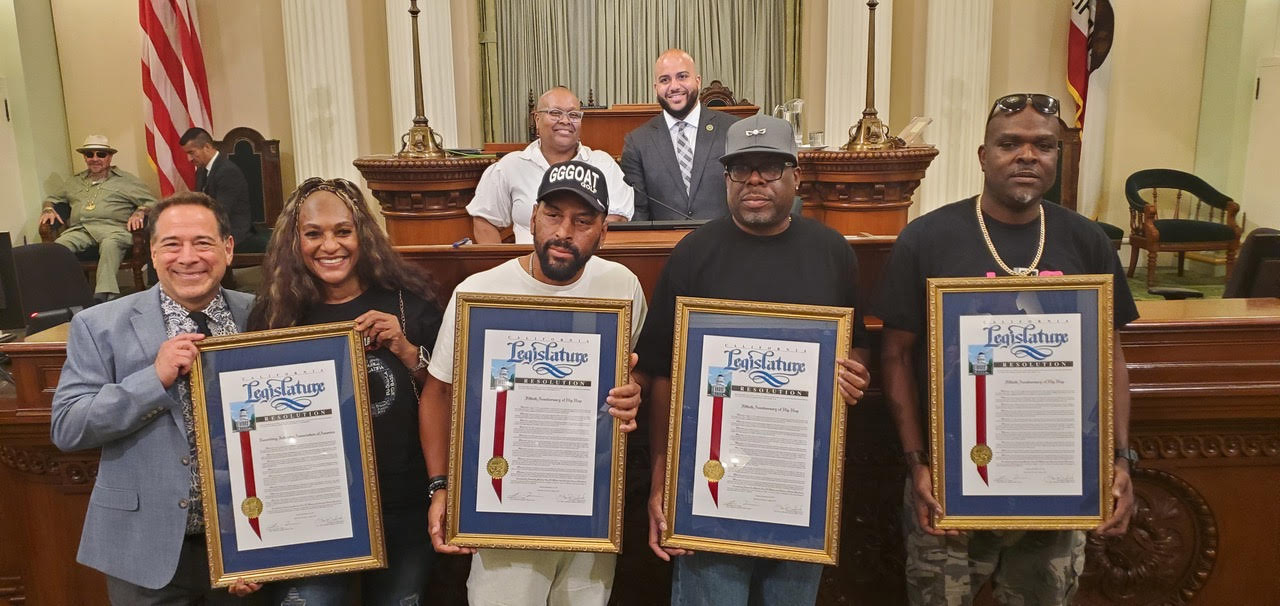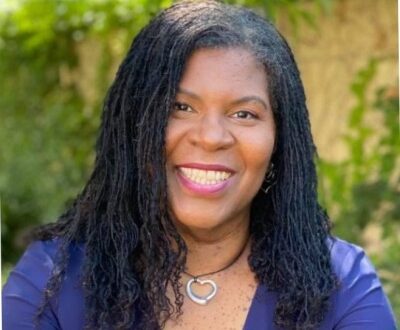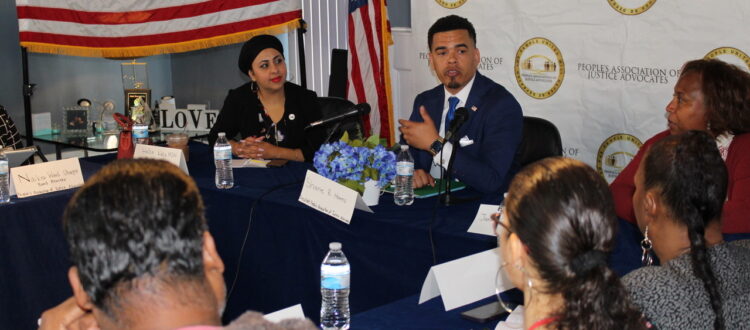Antonio Ray Harvey| California Black Media
The California Legislative Black Caucus (CLBC) and the Recording Industry Association of America (RIAA) celebrated the 5oth anniversary of hip hop on Aug. 14, with a tribute to the West Coast pioneers, leaders and innovators who shaped the genre.
The Bring the Peace Movement organized the rally and ceremony where speakers paid homage to the honorees.
Juana Burns-Sperling, co-founder of Rialto/Los Angelesbased all-female hip hop group JJ FAD, told California Black Media (CBM) that the love received from state lawmakers — which included standing ovations on both the Senate and Assembly floors — was a long time in the making, but well worth the wait.
“It was amazing. It was an honor to be there to represent the West Coast and represent my group,” said Sperling, who goes by the stage name, MC JB. “When I first heard about it my thoughts were, ‘finally’ because the West Coast seems to be left out of things that are going on right now. So, the fact that our (lawmakers) were honoring us, we didn’t have to rely on other geographical areas. I was truly happy. We’re finally getting recognized.”
The rap songs Sperling, “Baby D” (Dania Birks) and “Sassy C” (Michelle Ferrens) performed were produced by worldrenowned Hip Hop mogul Dr. Dre (Andre Young), and Arabian Prince (Kim Renard Nazel). They group was
signed to Ruthless Records.
JJ FAD (an acronym created with the names of the original group members in 1985: Juana, Juanita, Fatima, Anna, and Dana) reached the top of the charts with their signature song, “Supersonic” in 1988.
The program organized by Jamilia Land of the Bring the Peace Movement, featured a voter registration drive and
entertainment and was attended by CLBC chair Assemblymember Lori D. Wilson (D-Suisun City), ViceChair and Sen. Steven Bradford (D-Gardena) and other
officers and members.
“At the time of its founding, hip hop was met with vitriol from politicians. However, today a host of politicians, community organizations and leaders convene to honor the pioneers and architects of the hip hop movement,” Wilson said on the Assembly floor.
Sperling was joined at the State Capitol with West Coast hip hop artists and music producers King T (Roger McBride), Kid Frost (Arturo R. Molina Jr.), Arabian Prince Mistah F.A.B.(Stanley Cox), Micheal Latt, Karega Bailey, Tinish Hollins, Greg Mack, Violet Brown, LaRussell Thomas, Greg Mack, Casual from the Hieroglyphics (Jon Owens), Disco Daddy (Michael Khalfani), filmmaker Deon Taylor, and Alonzo “Lonzo” Williams.
Mickelle “Hayón” Hellon, Leila Steinberg (who was Tupac’s manager), the Magical Rock Band, and retired legislative aid Rory Kaufman were also recognized as honorees.
Known to the West Coast hip hop community as “Grand Master Lonzo,” Williams is the innovator behind the legendary R&B/Rap group “World Class Wreckin Cru,” that found major success with the 1987 hit “Turn Off the Lights.”
“When I called my partner and Senator, Sen. Bradford, and told him we need to do something for hip hop on the West Coast I had no idea that it would end up on the Assembly and Senate floors,” Williams told CBM. “My initial plan was to do something in Compton, get all the homies and OGs together and show some love. But here we are today, and it was a great event.”
Bradford and Williams “go way back” on the music scene of Gardena, Compton, and Los Angeles. They used to promote singing groups, bands, and hip-hop dancing cliques. The artists received a warm welcome from lawmakers in both chambers; thanks to Bradford, Wilson, and Sen. Lola Smallwood-Cuevas (D- Ladera Heights).
“Steve understood what we did back in L.A. back in the day because he was a part of it but only on another level,” Williams said. “Steve was a dance promoter before he became a Compton city councilman, assemblymember, and senator. He was my competition. It just made for a great situation.”
Williams is credited with launching the careers of Dr. Dre, Ice Cube (O’Shea Jackson), D.J. Yella (Antoine Carraby) and Eazy E. (Eric Wright), formerly known as N.W.A. The group is credited with ushering in a form of hip-hop music that was coined gangster rap.
The gangster rap genre propelled the careers of Snoop Dogg (Calvin Broadus Jr.), Nate Dogg (Nathaniel Hale), DJ Quick (David Marvin Blake), Above the Law, Warren G (Warren Griffin III), Lady of Rage (Robin Yvette Allen), Yo-Yo (Yolanda Whitaker), E-40’s (Earl Stevens) little sister Suga-T (Tenina Stevens), among others.
The elements of hip hop culture first emerged in the 1970s in Morris Heights, a neighborhood in the Bronx borough of New York City. Hip-hop consists of four elements: “deejaying,” or “turntabling,” “MCing” or “rhyming,” graffiti painting, and the hip-hop dance, style, and attitude of “B-boying.”
The West Coast artists extracted the characteristics and stylings from East Coast hip hop but were able to create their own musical flavor with stories, references and imagery that reflected street life and living in urban centers, mostly in California.
Gangster rap and the “G-funk era” dominated the hip-hop scene in the late 1980s and all through the 1990s from the Los Angeles region to Oakland/San Francisco Bay Area by standouts like Too $hort (Todd Anthony Shaw).
Joel Flatow, Senior Vice President, Artist and Industry Relations, and Chief of West Coast operations for RIAA, said the accolades bestowed on the artists in Sacramento are a tribute to the innovation and foresight they brought to the culture.
“We just have a tremendous wealth of talent in this state,” Flatow added.
RIAA is a trade organization that supports and protects the rights of artists and music labels in the US.
Adding to the cultural weight to the celebration, Land and other community activists issued a proclamation, offered samplings of poetry, gave shoutouts to hip-hop history, and appealed to the audience to become politically engaged champions of peace.
“This is a time of celebration and reflection,” stated Land, who is also the co-founder of the Anti-Violence, Safety, and Accountability Project (ASAP). “We acknowledge the monumental achievements of West Coast artists and also reflect on the effect of unresolved trauma and violence in the Culture.”











